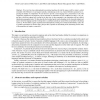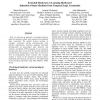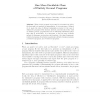71 search results - page 9 / 15 » The disjunctive decomposition of logic functions |
94
Voted
DAC
2009
ACM
16 years 2 months ago
2009
ACM
This paper describes a function-based timing-driven optimization technique for the synthesis of multi-level logic circuits. Motivated by the principles of parallel prefix computat...
119
click to vote
ICFP
2000
ACM
15 years 6 months ago
2000
ACM
We review the close relationship between abstract machines for (call-by-name or call-by-value) λ-calculi (extended with Felleisen’s C) and sequent calculus, reintroducing on the...
219
click to vote
EH
1999
IEEE
1999
IEEE
Evolvable Hardware or Learning Hardware? Induction of State Machines from Temporal Logic Constraints
15 years 6 months ago
Here we advocate an approach to learning hardware based on induction of finite state machines from temporal logic constraints. The method involves training on examples, constraint...
117
click to vote
DAC
2008
ACM
16 years 2 months ago
2008
ACM
Boolean function bi-decomposition is a fundamental operation in logic synthesis. A function f(X) is bi-decomposable under a variable partition XA, XB, XC on X if it can be written...
202
click to vote
ICLP
2009
Springer
16 years 2 months ago
2009
Springer
When a logic program is processed by an answer set solver, the first task is to generate its instantiation. In a recent paper, Calimeri et el. made the idea of efficient instantiat...



